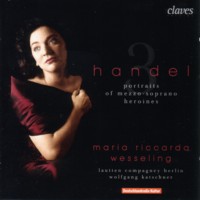Swiss mezzo-soprano Maria Riccarda Wesseling
sings across a range of styles, from Mozart to Carmen to Eötvös, and in
recent years has made several appearances in Handel operas, reaching a wider
audience in the DVD of Teseo. She has appeared in both male (Giulio
Cesare, Rinaldo) and female roles, and concentrates on the latter for this
recording, as the title would suggest. Wesseling has written her own liner
notes, which are more programmatic than musicological, explaining that (to
her, at least) the female roles have “a great deal more flesh and bones as
characters ... most often they turned out to be the actual masterminds and
principle figures in the respective operas”.
She has chosen three works and three such
figures: Medea from Teseo, Dejanira from Hercules (the
dramatic oratorio) and Zenobia from Radamisto (revised version). One
might quibble with the disc’s title and suggest that of these three, only
Zenobia really qualifies as a heroine, given that Medea has already killed
her children before this opera begins and hardly seems to have mended her
ways, and Dejanira is driven mad by jealousy and inadvertently kills her
husband. It is however an interesting decision to present a recital which
traverses and explores three individual dramatic roles, rather than the
usual grab-bag of “favourite arias”. The vocal performances are
interspersed with overtures and other orchestral pieces from the three
works.
As those who have seen the Teseo DVD
will know, Wesseling is an intensely dramatic performer onstage, and this is
also the case here, where she has only her voice to rely on. It is an
excellent instrument, not perhaps as rich as some prominent mezzos, but
smooth and accurate with a polished surface. She has good control, singing
unaspirated melismas with a graceful legato and holding the proper vowel
sounds with little spreading. She sings here with little vibrato,
occasionally intensifying it for dramatic effect. Wesseling’s diction is
excellent in both Italian and English, and one is left in no doubt as to her
understanding of the words and their import. Her ornamentation is dramatic
but always tasteful; one might have wished indeed for a little more. The
playing of Lautten Compagney under Katschner’s direction is similarly
pleasing, with appropriate tempi.
If there is a criticism, it is that the program is rather limited in its
emotional range. To be sure, the various “heroines” traverse a range of
emotional states, including grief, despair, sorrow, jealousy, mockery,
vengefulness, lunacy - but nothing lighter, and nothing joyful; in short,
no really bright bravura arias. Of course none of these ladies have that in
their roles. One should probably just be grateful that for once a Handel
recital disc is taken as an opportunity to display the talents of Handel the
dramatist in crafting these women with their “flesh and bones”, as well as
the formidable talents of Wesseling and Katschner.


